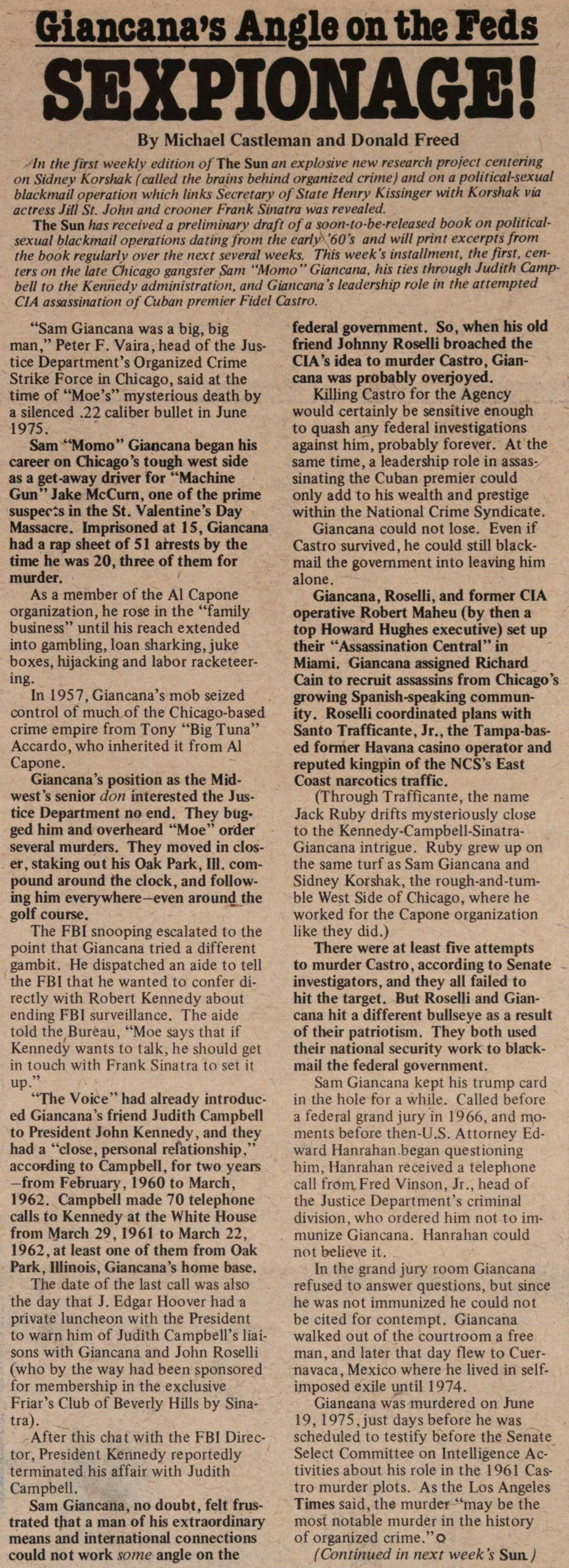Giancana's Angle On The Feds

SEXPIONAGE!
By Michael Castleman and Donald Freed
In the first weekly edition of The Sun an explosive new research project centering on Sidney Korshak (called the brains behind organized crime) and on a political-sexual blackmail operation which links Secretary of State Henry Kissinger with Korshak via actress Jill St. John and crooner Frank Sinatra was revealed.
The Sun has received a preliminary draft of a soon-to-be-released book on political-sexual blackmail operations dating from the early '60 's and will print excerpts from the book regularly over the next several weeks. This week 's installment. the first, centers on the late Chicago gangster Sam "Momo " Giancana, his ties through Judith Campbell to the Kennedy administration, and Giancana 's leadership role in the attempted CIA assassination of Cuban premier Fidel Castro.
"Sam Giancana was a big, big man," Peter F. Vaira, head of the Justice Department's Organized Crime Strike Force in Chicago, said at the time of "Moe's" mysterious death by a silenced .22 caliber bullet in June 1975.
Sam "Momo" Giancana began his career on Chicago 's tough west side as a get-away driver for "Machine Gun" Jake McCurn, one of the prime suspects in the St. Valentine's Day Massacre. Imprisoned at 15, Giancana had a rap sheet of 51 arrests by the time he was 20, three of them for murder.
As a member of the Al Capone organization, he rose in the "family business" until his reach extended into gambling, loan sharking, juke boxes, hijacking and labor racketeering.
In 1957, Giancana's mob seized control of much of the Chicago-based crime empire from Tony "Big Tuna" Accardo, who inherited it from Al Capone.
Giancana's position as the Midwest's senior don interested the Justice Department no end. They bugged him and overheard "Moe" order several murders. They moved in closer, staking out his Oak Park, III. compound around the clock, and following him everywhere- even around the golf course.
The FBI snooping escalated to the point that Giancana tried a different gambit. He dispatched an aide to tell the FBI that he wanted to confer directly with Robert Kennedy about ending FBI surveillance. The aide told the Bureau, "Moe says that if Kennedy wants to talk, he should get in touch with Frank Sinatra to set it up.
"The Voice" had already introduced Giancana's friend Judith Campbell to President John Kennedy, and they had a "close, personal relationship," according to Campbell, for two years -from February, 1960 to March, 1962. Campbell made 70 telephone calls to Kennedy at the White House from March 29, 1961 to March 22, 1962, at least one of them from Oak Park, Illinois, Giancana's home base.
The date of the last call was also the day that J. Edgar Hoover had a private luncheon with the President to warn him of Judith Campbell's liaisons with Giancana and John Roselli (who by the way had been sponsored for membership in the exclusive Friar's Club of Beverly Hills by Sinatra).
After this chat with the FBI Director, President Kennedy reportedly terminated his affair with Judith Campbell.
Sam Giancana, no doubt, felt frustrated that a man of his extraordinary means and international connections could not work some angle on the federal government. So, when his old friend Johnny Roselli broached the CIA 's idea to murder Castro, Giancana was probably overjoyed.
Killing Castro for the Agency would certainly be sensitive enough to quash any federal investigations against him, probably forever. At the same time, a leadership role in assassinating the Cuban premier could only add to his wealth and prestige within the National Crime Syndicate. Giancana could not lose. Even if Castro survived, he could still blackmail the government into leaving him alone.
Giancana, Roselli, and former CIA operative Robert Maheu (by then a top Howard Hughes executive) set up their "Assassination Central" in Miami. Giancana assigned Richard Cain to recruit assassins from Chicago's growing Spanish-speaking community. Roselli coordinated plans with Santo Trafficante, Jr., the Tampa-based former Havana casino operator and reputed kingpin of the NCS's East Coast narcotics traffic.
(Through Trafficante, the name Jack Ruby drifts mysteriously close to the Kennedy -Campbell-Sinatra-Giancana intrigue. Ruby grew up on the same turf as Sam Giancana and Sidney Korshak, the rough-and-tumble West Side of Chicago, where he worked for the Capone organization like they did.)
There were at least five attempts to murder Castro , according to Senate investigators, and they all failed to hit the target. But Roselli and Giancana hit a different bullseye as a result of their patriotism. They both used their national security work to blackmail the federal government.
Sam Giancana kept his trump card in the hole for a while. Called before a federal grand jury in 1966, and moments before then-U.S. Attorney Edward Hanrahan began questioning him, Hanrahan received a telephone call from Fred Vinson, Jr., head of the Justice Department's criminal division, who ordered him not to immunize Giancana. Hanrahan could not believe it.
In the grand jury room Giancana refused to answer questions, but since he was not immunized he could not be cited for contempt. Giancana walked out of the courtroom a free man, and later that day flew to Cuernavaca, Mexico where he lived in self-imposed exile until 1974.
Giancana was murdered on June 19, 1975, just days before he was scheduled to testify before the Senate Select Committee on Intelligence Activities about his role in the 1961 Castro murder plots. As the Los Angeles Times said, the murder "may be the most notable murder in the history of organized crime. "
(Continued in next week's Sun.)
Article
Subjects
Freeing John Sinclair
Old News
Ann Arbor Sun